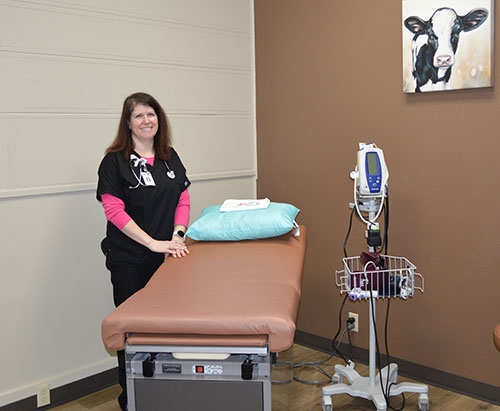You are here
Home ›March is National Colorectal Cancer Awareness Month: See your local provider to have a colonoscopy scheduled

VMH offers colorectal cancer screening services ... March is National Colorectal Cancer Awareness Month. One in 24 Americans will be diagnosed with colorectal cancer in their lifetime. Unfortunately, only about one in three persons in the U.S. gets the recommended screening. Michelle Crary, pictured above, Nurse Practitioner at the Veterans Memorial Hospital Medical Clinic-Postville shares the risks, symptoms and testing information in the fight against colorectal cancer. Submitted photo.
by Michelle Crary, Nurse Practitioner, VMH Medical Clinic-Postville
Colorectal cancer can be easily detected, yet it remains the third leading cause of cancer in the United States. According to the American Cancer Society, one in 24 Americans will be diagnosed with colorectal cancer in their lifetime. A total of 52,550 lives are expected to be lost in 2023 due to colorectal cancer. The death rate is dropping due to screening procedures, but unfortunately, only about one in three persons in the U.S. gets the recommended screenings. Both men and women are at risk for colorectal cancer. Other risk factors include:
• Age 50 or older - younger adults can get it but it’s much more common after age 50.
• Personal or family history of colorectal cancer or polyps
• Personal or family history of inflammatory bowel disease such as colitis or Crohn’s
• Certain genetic factors such as Gardner’s syndrome, Lynch Syndrome, Ashkenazi Jewish descent, African American descent
• Having Type 2 Diabetes
• Smoking or other tobacco use
• Alcohol intake
• Diets high in red or processed meats
• Obesity
• Physical inactivity
Colorectal cancer might not cause symptoms right away, but if it does, it may cause one or more of these symptoms:
• A change in bowel habits, such as diarrhea, constipation, or narrowing of the stool, that lasts for more than a few days
• A feeling that you need to have a bowel movement that’s not relieved by having one
• Rectal bleeding with bright red blood
• Blood in the stool, which may make the stool look dark
• Cramping or abdominal (belly) pain
• Weakness and fatigue
• Unintended weight loss.
Preventive screenings are now recommended starting at age 45 or sooner, depending on family history, and continue screening through age 75. There are different options available for detecting colorectal cancer: stool testing, such as testing for blood or DNA; barium enema; and colonoscopy. Colonoscopies are routinely performed at Veterans Memorial Hospital surgical department. The benefit to having a colonoscopy is that we can find colorectal cancer early when it’s still small. During a colonoscopy, we can remove the polyps (questionable tissue growths) before they have a chance to turn into cancer.
If you have questions concerning symptoms or colorectal cancer risk, or for more information, call me at the Veterans Memorial Hospital Medical Clinic-Postville at 563-864-7221.

